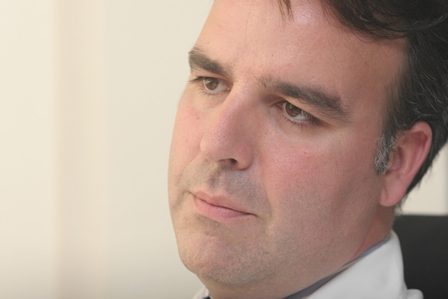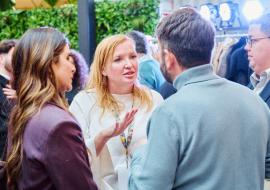Q & A with Jorge Oliver-Rodés, Director General of Dr. Oliver Rodés Laboratory

Within the framework of Termatalia 2014, we sat down with Jorge Oliver-Rodés, who manages the Dr. Oliver Rodés Laboratory in Barcelona, Spain. The specialist shared his views on the Fair, detailed the characteristics and functions of his laboratory and assessed the way it can contribute to the technical tasting of waters, so sommeliers can do quality pairings.
You’ve attended several editions of Termatalia. What do you make of this one held in Argentina?
Quite interesting. We’ve established contacts with authorities and professionals from different countries. This has been the second edition of Termatalia taking place in Latin America and it has been positioned as the international fair of the sector.
Do you work in the lab or you just run it?
I work in the laboratory as the Director General and I’m a member of a family society.
What is the laboratory specialized in?
We’re specialized in assessing and analyzing all types of water. We collaborate with companies to provide solutions so they can tailor their costs. We also do applied research, training and certifications.
Drinking water, sewage water or pool waters; what kind of water do you work with?
All kinds of waters, from natural well waters to reusable waters, which go through a specific process and are no longer sewage, so they can be used for irrigation. Drinking waters, natural mineral waters, mineral-medicinal waters, production, purified for pharmaceutical use, irrigation, construction, sewage; any kind of water.
Do you think the culture of thermal waters or spa in Argentina has reached the level required for this country to have an important development in the world of spas?
No. I believe that the current legislation is not at the necessary level to exploit and protect this natural resource, although the government is interested in improving the situation.
This kind of waters should be promoted according to the existing reality, which is wonderful.
Argentina clearly has thermal water deposits. The one in Terma de Río Hondo seems to be one of the most important deposits of the country, perhaps one of the biggest in Latin America.
That’s right. According to what I’ve heard these days of technical sessions and explanations given by experts of the area, there are over nine thousand wells of people that are constantly extracting thermal water and that’s hard to understand, at least by the Western and European way of thinking. It’s a spectacular aquifer.
Could the abuse of these wells make them dwindle or dry out for some time?
There is such a volume of flow that I don’t think the wells might be dried out, but the typology and quality of the water might be affected. Some spas have reduced the number of wells in an effort to protect the aquifer.
Do you recommend establishing control and regulations that haven’t been outlined yet?
Absolutely. The use must not be prohibited, it must be regulated to protect the existing resource because if the aquifer is damaged it might not disappear, but there is high risk of having it modified. It’s necessary to have this situation controlled and stop extracting more water than the volume that naturally flows.
What does your laboratory do in terms of hygiene and quality of water to obtain better results?
We can help to apply the legislation, characterize each kind of water since, depending to the origin and chemical composition; there are different therapeutic uses to be specified by a hydrologist. We also collaborate with a significant number of spas and hotels when it comes to providing systematic hygienic-health control so the use of water is safe. These are complex waters that, in some cases, facilitate the proliferation of such pathogenic bacteria as legionella bacterium. The bathers are to be protected from any risk and it’s not difficult if you work with quality.
When it comes to tasting waters to check their quality, hardness, salinity, what can your laboratory do for this tasting session to be more objective and how must water sommeliers use the information provided by a laboratory to do a true tasting?
For instance, we do what we call technical water tastings, so we characterize water. Characterizing water entails highlighting, detailing and specifying the amount and kind of minerals in each natural mineral water. That’s the base for sommeliers to do a fine pairing or say what water is harder, with higher load of minerals, the specific food it can be combined with, carbonic waters are better for meat, help with the digestion, etc.
Where are you specifically based inside Spain?
We are in Barcelona and work with Spain and Europe, although we also collaborate with North Africa and Latin America.
Do you know any laboratory that runs water comparisons to know their properties?
I don’t know other specialized laboratories, because they normally issue analytical bulletins without interpreting the results or advising when it comes to solving problems. In terms of water, specifically canned or mineral-medicinal water, there is no other expert in Spain. I’m talking about laboratories that understand or assess the differences among waters depending on their composition.
When we mention such waters as Evian, Ana or any other famous water –most of them are Italian- do you think that there are other waters that might stand as potential competitors?
I do think so, absolutely. Each mineral water features a specific chemical composition that characterizes it. Therefore, all waters are different and each one has qualities that make it stand apart from the rest. If those you have mentioned are better positioned in the market, it might be related to the available flow, marketing, economic capacity, etc. In my opinion there are no best or worst waters. They are all different with particular characteristics. The fact is that the consumers have their own preferences and most of them, when explaining the reason why they prefer specific water, just say that “that’s the one they like the most”.














